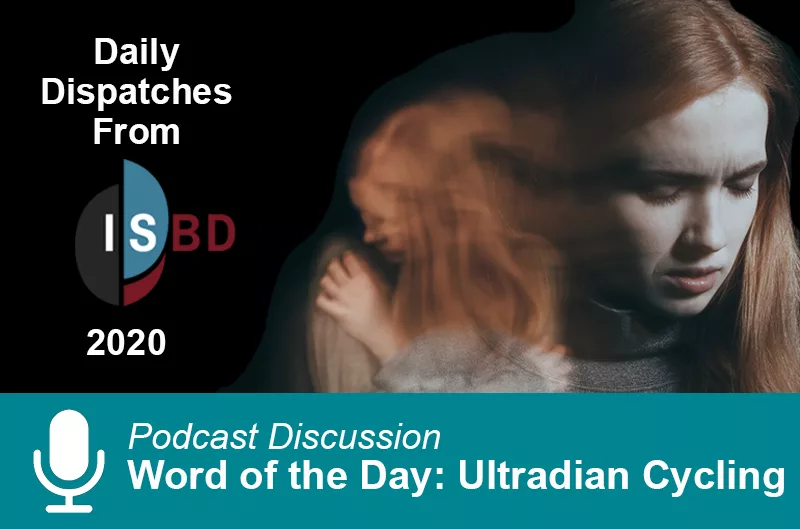Every disorder has its obscure terminology, and the word of the day from the International Bipolar conference is: Ultradian cycling.
Published On: 7/4/2020
Duration: 4 minutes, 41 seconds
Transcript:
Every disorder has its obscure terminology, and the word of the day from the International Bipolar conference is: Ultradian cycling.
If you’ve read your DSM you know what rapid cycling means. Actually, it’s not that rapid – it only takes 4 episodes a year to qualify for this bipolar-specifier. When the speed turns up a notch, it’s called ultra-rapid cycling, which means at least 4 episodes a monthly ─ weekly. Then there’s ultradian cycling, which is the fastest form of mood cycling known to humankind.
Ultradian means more than an hour but less than a day, so patients with ultradian cycling have mood episodes that change in less than a 24 hour period. Robert Post first described this in the 1980’s, and when he saw it on the NIMH inpatient unit he didn’t believe it was real. Most psychiatrists thought that cycles that frequent were due to a personality disorder rather than a mood disorder. And while ultradian cycling is often seen in borderline personality disorder, a few things stood out in these cases that lead Post to believe it was due to bipolar
- The patients had long periods of doing well without signs of personality disorder like unstable relationships
- The brief episodes did not seem triggered by external events, although they can be
- The cycling responded ─ often completely ─ to mood stabilizers and sometimes got worse with antidepressants
When mood episodes cycle – whether it’s every month or every day – they can cycle in all directions. So you may not see the classic “up and down” of mania and depression. Just having 4 depressed episodes in a year would qualify as rapid cycling bipolar, even if the patient never went above the line into mania or hypomania.
In ultradian cycling, you’ll likely see swings into irritability, impulsivity, anxiety, and depression. It’s also called ultra-ultra rapid cycling.
Although it’s now recognized that moods can change within a day in bipolar disorder, ultradian cycling is not without controversy. Some would prefer to classify it as a mixed state. DSM-5 does not require that manic and depressive symptoms overlap at the exact same time to qualify for a mixed state. As long as they happen within the same week it’s enough. And when you see a patient in a mixed state you’ll likely see some ultradian cycling: Most often they have depressive symptoms in the morning and manic ones at night.
To summarize: For rapid cycling think SEASONAL, QUARTERLY: 4 episodes year, ultra-rapid is WEEKLY, at least 4 per month, and ULTRADIAN cycles change within a day. Often these faster episodes happen when rapid cycling goes untreated and speeds up.
The first step in treatment is to try to reduce things that can cause rapid cycling: antidepressants, drugs of abuse, thyroid abnormalities, and irregular sleep schedules. Rapid cycling is thought to respond better to anticonvulsants and than to lithium, but there are lots of exceptions to that rule. Robert Post has published some promising results on calcium channel blockers like nimodipine in the faster, ultra-rapid and ultradian forms of these cycles.
Tomorrow is the last in our daily series on bipolar, an update on the mind-gut connection: The results of 93 clinical studies that tested whether you can treat depression by improving the microbiome. If you like waking up to a daily episode, let us know by leaving a review in your podcast store, and we’ll try to keep up the pace. We’ll have more updates in our print issue, including unpublished results on a new medication for bipolar depression and a full review of the modafinils in bipolar disorder.
Got feedback? Take the Podcast Survey.


_-The-Breakthrough-Antipsychotic-That-Could-Change-Everything.webp?t=1729528747)



